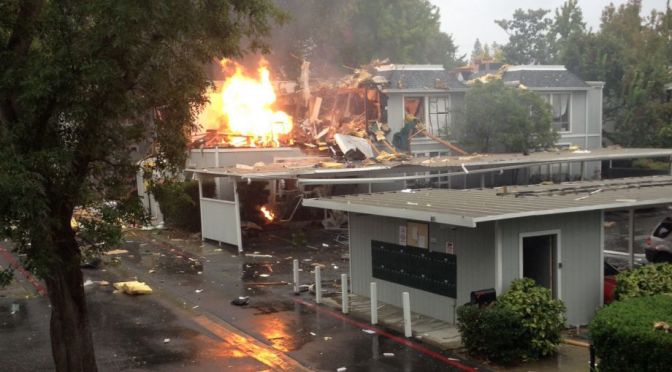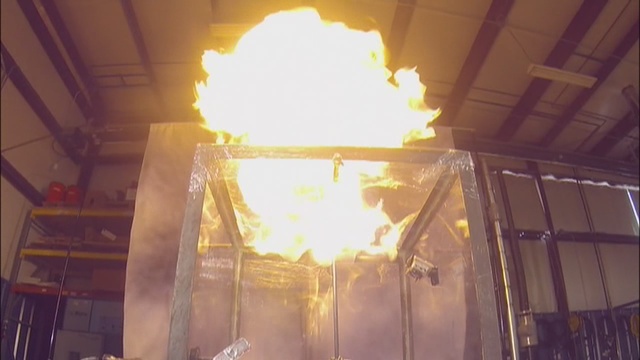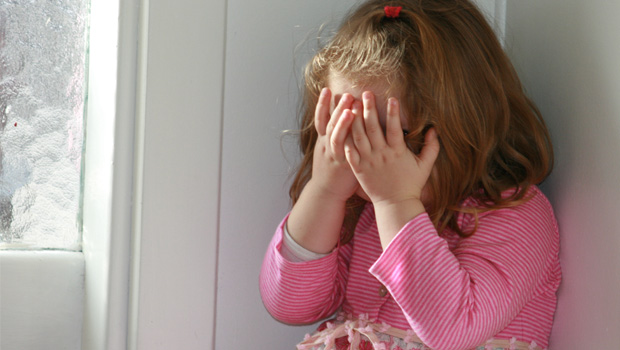Since 2011, at least 68 people were treated for burns caused by butane hash oil fires and explosions, at northern California burn centers, including Shriners Hospital for Children, Sacramento, and at the UC Davis Regional Burn Center.
Usually those making BHO suffer the most, but several times it has happened at homes with children. The most recent baby who was badly burned in a hash oil (BHO) explosion was a 19-month old boy at a student housing complex in Montana. The law has not kept up with the problem, as parents who engage in this deadly practice still have custody and visitation rights. Children are threatened by neighbors who do it, too.
Butane hash oil (BHO) production is a marijuana extraction process which has exploded in popularity over the past three years. The victim had burns covering 28% of the body, according to Dr. David Greenhalgh, reporting to the Sacramento Bee in August. A past president of the American Burn Association, he called hash oil burns an “epidemic.” Greenhalgh’s research in wound care, skin grafts and reconstruction make him a leading national figure in the burn field.
Thanks to quick emergency response and to the quality of emergency medical treatment available in the United States, it appears that all of the children have survived. However, we have raised a group of young adults who are so accustomed to hearing “marijuana is safe” that they have no notion of the need to protect children from the dangers pot involves.
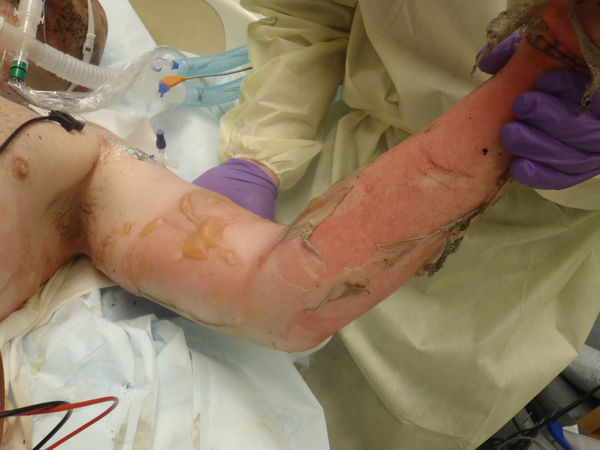
Those who make BHO and cause the explosions–31 in Colorado, this year, 20 in San Diego County within a year, 6 in Riverside County, 6 in San Bernardino County, 6 near Portland, OR and 7 in the Puget Sound—have been extraordinarily lucky. Of those who died from hash oil explosions, at least one was in California, one in Oregon and one in Hawaii. Two of the deaths were neighbors who were affected by the fires. In Spokane, WA, a neighbor with respiratory problems died two months after the fire in January, while in Bellevue, WA, it was a former mayor of the city who died from a broken pelvis. (see previous articles on this topic)
Downloadable Fact Sheet
Get the Parents Opposed to Pot Hash Oil Facts! Download our new flyer, which describes the hash oil explosions in states which have permissive marijuana laws: POPPOT-Hash Oil Statistics.
Hash oil explosions increase with legal marijuana, as has happened up and down the west coast, including four explosions in late November, one each in California, Colorado, Oregon and Washington. There is a question as to how much lax enforcement of marijuana laws in parts of Washington, Oregon and California have allowed the practices to continue.
Fires while in the Care of Neglectful Parents
At least 2 children died by fire this year when neglectful parents smoked marijuana. BHO is not the only way marijuana users threaten children by fire, because pot-smoking parents can be “out of it” and consumed by addiction. Two-year-old Levi Welton of Sterling, Colorado, was left alone with his four-year-old brother with matches while his parents smoked marijuana with friends in another room. (The parents and his brother survived.) In Oregon, during the last week of October, a mother was high on marijuana as a fire consumed her four-year old son. Neighbors reported her too stoned to be aware and to show any emotion when her son died.
It also happened last year in a state without a legal marijuana program. In Pennsylvania woman pled guilty to leaving her 3-year-old twins to die in a fire while she left the house to see whether her marijuana had been stolen by her 15-year-old daughter. Police say the boys turned on a burner on a grease-covered stove, sparking flames that soon engulfed the house.
The cost of an addiction is putting the substance ahead of the loved ones. About 1 in 6 who begin using marijuana under age 18 become addicted, although marijuana promoters claim it is not addictive.
Oregon recently enacted a law forbidding daycare employees and operators from using medical marijuana. Let’s hope other states follow suit, and that, in family courts, states do not give custody and visitation rights to marijuana-using parents, especially those making BHO.
As California Gov Jerry Brown has said, the world is too dangerous a place for Americans not be alert by using pot. This concept applies to parenthood. Parenthood is too large a responsibility for us not to protect our children. We need not expose small children to the manufacture of BHO or put them in the care of parents who prioritize marijuana over their children. However, when neighbors make hash oil, parents may have no warnings.
Our tolerance for marijuana has taught a new generation of young adults that marijuana is safe. Making BHO is mainly done in western states, but the explosions have happened in Florida, Ohio, Massachusetts, Florida, Chicago, Michigan, Virginia, Houston. It will spread east if we don’t watch out. No longer should anyone say, “safer than alcohol” or “it’s just pot.” We have sent the wrong message, and need to replace it with a message that parenting and pot use do not mix.
Hash Oil Explosions Continue in California
At least five hash oil explosions have erupted in California over the past month while residents were using butane to extract “honey” oil from marijuana. The worst fire occurred in Walnut Creek on Halloween, when a 4-unit apartment building went up in flames. The entire street was affected, and a total of 12 apartment units were uninhabitable after the fire was put out.
On Tuesday, two men and one woman were arrested in Arroyo Grande, after detectives served a search warrant for a home with a butane honey oil conversion lab. A 10-month old baby was found sleeping on a mattress surrounded by marijuana, pipes and broken glass. There was also a 12-year old and a 15-year old in the home.
The most recent hash oil fire happened Wednesday night in Muscoy, San Bernardino County, east of Los Angeles. One man died and another man and a woman are in critical condition. It was the 6th event involving a marijuana lab in that county this year. The LA Times reported 20 hash oil explosions happened in San Diego County within one 14-month period of 2013-2014.
In truth, hash oil labs have replaced meth labs as the most dangerous drug manufacturing process in the US during this decade. The worst hash oil explosion occurred a year ago in Bellevue, WA.
Making BHO is becoming increasingly popular because VAPE PENs are now available. Tiny, potent “dabs” are put in the vape pens and go undetected because they don’t leave a smell or emit smoke. While marijuana today typical has 10-18% THC, the psychoactive element to bring the high, hash oil has up to 50-80% potency for a quicker, more lasting high.
“Honey,” “wax”, “dabs,” “budder,” “BHO,” “710,” “earwax,” and “shatter” are common terms for this trendy way to use marijuana. Makers follow online instructions, some shown on videos. Butane is the most popular way to make it, but not the only flammable product used.
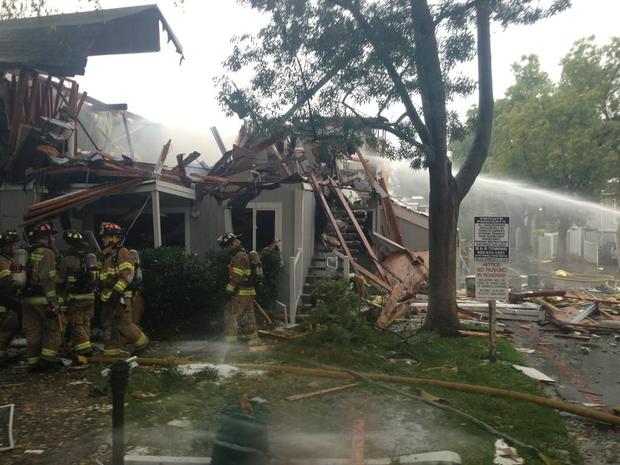
Two men burned in Ukiah from a hash oil explosion on November 4. They had to be flown by helicopter to the hospital. The butane ignited when one of the men lit a cigarette, in the shed behind the house. Another hash oil explosion caused an estimated $100,000 to a home in Visalia, near Fresno, a week earlier.
Those who keep advocating for marijuana legalization need to consider the cost of public services for the explosions which mainly occur in California, Washington, Oregon and Colorado.
If we have legalization, we need to think about protecting the children, and if parents who endanger their children with drug usage should lose custody and visitation rights in divorce proceedings. If marijuana is legalized, explosions wouldn’t stop, as the pot promoters like to tell us.
Hash oil explosions happen less frequently on the east coast, and in other parts of the country. However, a hash oil blast in Missoula, Montana, happened in a university housing complex, where a student’s boyfriend was making BHO and endangering her toddler. The man, woman and child had to be treated for injuries. Also in October, a 20-year old boy started a fire in his parents’ house in Jackson, Michigan. He was a medical marijuana cardholder.
We need to ask why many “medical marijuana patients” are so addicted that they ask for these quick highs. Could it be that medical marijuana providers are encouraging addiction to keep them permanently incapacitated? The man in Missoula had been burned previously, yet he continued to make hash oil, illegally. We need to recognize how addictive this marijuana extract is!
Get the Parents Opposed to Pot Hash Oil Facts! Download our new flyer, which describes the hash oil explosions in states which have permissive marijuana laws: POPPOT-Hash Oil Statistics.
Hash Oil Explosions Rise with Legal Pot
Another consequence of changing a public policy to benefit the 6- 7% of adults who use marijuana is the slew of hash oil explosions which have occurred this year. Making BHO, butane hash oil is a relatively easy, but dangerous, process.
Did anyone figure ambulances, fire fighters and emergency medical care into the cost of legalizing marijuana? Voters in Oregon, Alaska, Washington, DC, and two cities, Lewiston and South Portland, Maine, need to think of possible consequences before legalizing another dangerous drug. States considering medical marijuana also need to factor in the legality of making BHO, and the cost for public services when the fires occur.
Downloadable Fact Sheet
Get the Parents Opposed to Pot Hash Oil Facts! Download our new flyer, which describes the hash oil explosions in states which have permissive marijuana laws: POPPOT-Hash Oil Statistics.
Denver Mayor Michael Hancock called a meeting last week to pass an ordinance that would restrict unlicensed amateurs using flammables to process marijuana. There have been 8 blasts in the city of Denver this year, and 31 in the state. After an objection was voiced at the meeting on September 15, the discussion was tabled.
Congress made a huge mistake, when on May 30, the House of Representatives voted not to allow Drug Enforcement Administration (DEA) funds to be used to investigate federal violations in states with medical marijuana.
Like passing child protection laws, or keeping the marijuana businesses out of communities, it seems impossible to pass any restrictions which might stop marijuana consumption, commerce or expansion in Colorado. (Marijuana has caused three non-traffic deaths in Colorado this year: one incidence of child neglect in January and two deaths from potent edibles, in March and April.)
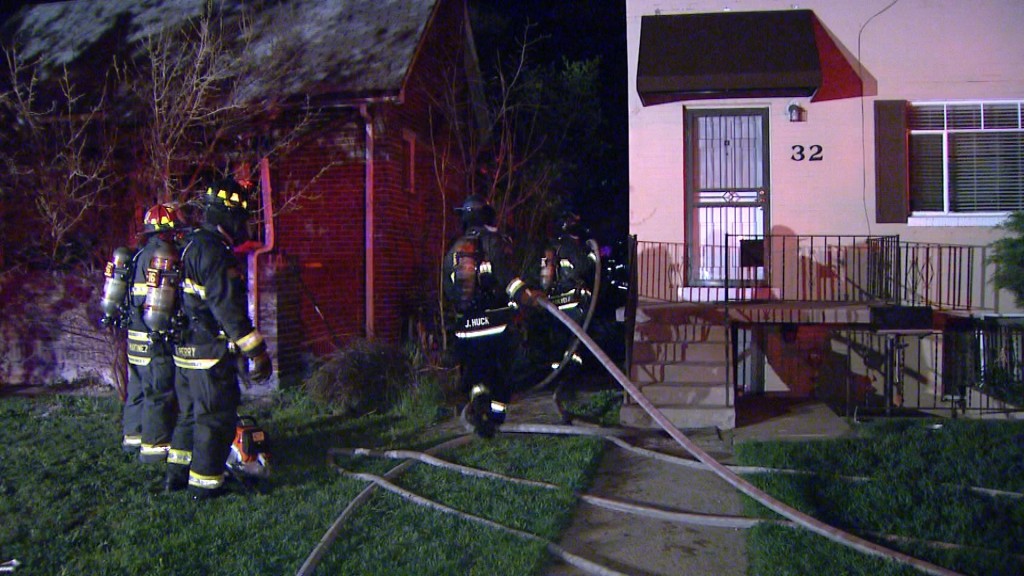
The marijuana industry told voters marijuana is “safer than alcohol,” but the social and public service costs must be staggering by now. The fires and explosions are increasing, because extracting hash oil from marijuana has become more popular. The promised tax revenues from marijuana are much lower than was projected, and black markets still thrive.
Seared Skin and Burn Centers
“Hash Oil’s Trail of Seared Skin and Annihilated Homes” reports of one death in Hawaii early this year and one death in Oregon last year. “March Madness” was a term used to describe the numerous hash oil blasts that took place during one month this year. Five explosions happened in Colorado during one week in April.
Butane hash oil must be made in an open or well-ventilated area. If the butane sparks something else, explosions can occur. What makes it dangerous is that butane is highly flammable, sensitive to heaters, pilot lights, electric cords, a cigarette or the slightest spark of a match.
Of the 31 hash oil explosions that had occurred in Colorado by early May this year, 21 involved injuries and 10 of those suffered from major burns requiring extensive treatment. In the previous year, there were 11 such explosions in the state, with 11 people treated for burns. According to an official of the state’s burn center, at University of Colorado’s burn unit, the first explosion occurred in 2012. Most victims are males in their 20s and 30s.
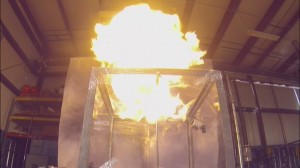
A request to search the records of Oregon’s only burn center over a 16- month period showed that 17 people were treated for butane hash oil burns, including two residents of southwest Washington. A 12-year old girl sustained broken bones after jumping from the 2nd floor, to escape a Medford, Oregon, hash oil fire last November.
In California, during a 14- month period from 2013 to early 2014, 27 people were treated for hash oil burns in one Northern California burn unit, 17 in southern California centers. In California, it’s legal for medical marijuana patients to use or buy the hash oil, but illegal for amateurs to make it. We have written previously of the children endangered by theses blasts.
Fortunately, no one has died in Colorado from BHO-explosions, though some people have sustained horrible burns.
As far as state law goes, making the hash oil in a home is perfectly legal in Colorado, as reported on ABC7 News. Charges of arson or child endangerment can be filed, however, when there is property damage, others are put in danger, or children are nearby.
Homes, Apartments and Property Damage
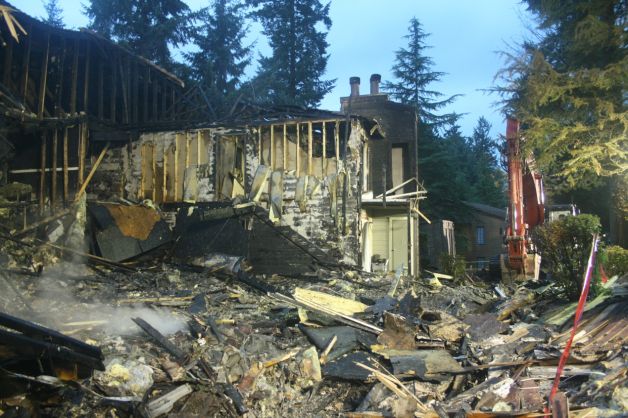
Federal District Attorneys in Washington, California and Oregon have been excessively slow in response to the explosions, despite the extensive damage to property, deaths and injuries to others. The explosions began 2-3 years ago on the West Coast, but it is only in the last few months that the Department of Justice appears to have decided that action is necessary.
Last weekend the Los Angelos Times reported 20 butane hash oil explosions in San Diego County, alone, within the year. There was $1.2 million of damage to an apartment building in San Diego last January. The explosions have occurred from New England to Florida, and from to British Columbia to Arizona.
In May, the Oregonian ran a series of online articles about BHO (butane hash oil), detailing the hows and whys of making it, and the explosions. It has only become popular in the last 3 years.
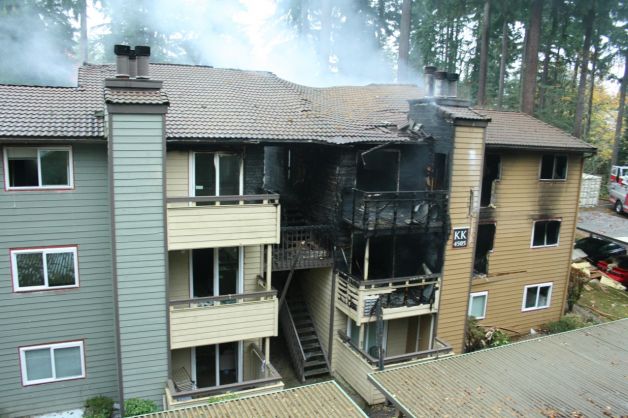
On July 22, 2014, the US attorney in western Washington filed charges against seven people, mainly for “endangering human life while manufacturing controlled substances.” The individuals caused fires or explosions in Seattle, Puyallup, Kirkland and Bellevue. The Bellevue fire caused a massive explosion to an apartment complex, $1.5 million in damages, and killed a former mayor of Bellevue. During this occurrence, two women experienced multiple fractures, having jumped from second- and third-floor windows to escape flames.
One of those facing federal charges in Puyallup, Washington, was making the hash oil for a marijuana edibles. He’s the owner of an edibles’ company, “Capn Cosmics.” Additionally, he’s charged with endangering the life of a 14-month old child.
The District Attorney in Washington asserts that the actions are illegal, because they cause harm to others and to property, although in the past officials found issues of legality hazy in Colorado, Washington and Oregon.
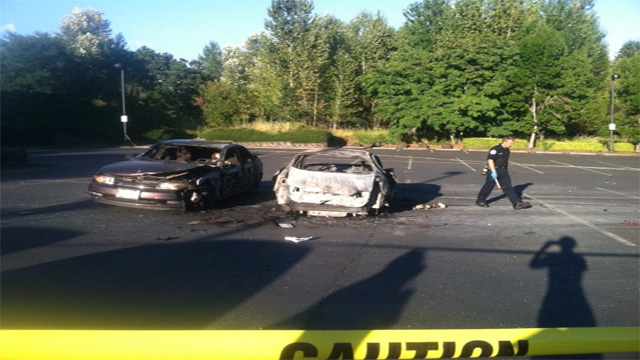
On July 29 in Tigard, Oregon, a parking lot explosion injured one and destroyed or damaged five motor vehicles. A grand jury indicted a California man for knowingly and intentionally creating a substantial risk of harm to human life in connection materials exploded, and for manufacturing marijuana. It’s thought to be the first time the U.S. Attorney’s Office in Oregon has filed charges in connection with a hash oil explosion.
State regulations in California and Colorado haven’t stopped the explosions. California doesn’t allow medi-pot patients to produce BHO, while Oregon and Washington’s medical pot programs don’t regulate BHO. Colorado and Washington require BHO to be tested for residual butane before being placed on dispensary shelves.
Why is Hash Oil Popular?
Marijuana users are looking for the quicker, faster high—even though they think marijuana is not addictive. Yet, there are great psychological risks, too, and some users have had psychotic episodes from using this potent substance.
For sellers, it’s an easy way to make large profits. However, making it at home is so much cheaper, and it’s gaining popularity.
There are plenty of YouTube videos and other online instructions for amateurs to follow. Makers begin by putting cannabis leaves and flowers in an extraction tube, like a pipe. They then put the colorless, odorless butane in that small area to extract the THC quickly, letting it fall through a small filter on bottom. Spraying with butane is called blasting the marijuana, which pulls the THC right out of it.
Problems are most likely to occur indoors or when there is not good ventilation.
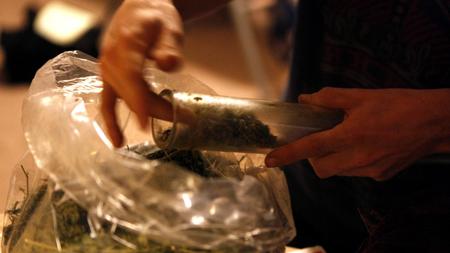
The solvent or butane must be flushed out. It can be boiled off in a hot water bath, which is why some home producers use hot baths or double boilers. Many commercial enterprises have the butane pumped out with a vacuum vacuum chamber to lower butane’s boiling point, pulling butane from the oil.
The result is a hash oil which looks like honey. It’s like the crack cocaine of marijuana. The THC content can be 70 to 85 percent, while the average joint may be 20 to 25 percent THC. After cooling, the oil hardens and is broken into bits. Sometimes the explosions occur in the cooling process, as when the refrigerator door blew off in Manitou Springs.
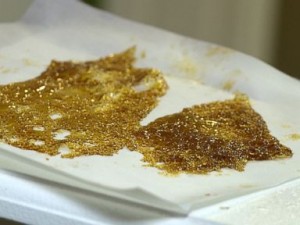
There are many nicknames for butane hash oil: “Wax,” “Honey oil,” “earwax,” “dabs” “shatter” and more. It could be smoked, vaped or infused into the edibles. Vaping is a concern, since the vape pens are the e-cigarettes of marijuana. It is a way that teens may be using marijuana without detection.
In short, hash oil offers a quick and lasting high for users. A single hit can last more than a day. By making it, it costs a user about 50% less than it would by buying it from a licensed dispensary or maker.
Violence, Anger, Explosions: Children in Danger
(Part two of Marijuana and Child Neglect/Abuse. Last week we published an article about neglect; this week we cover violence, anger and explosions.) A 15-year old boy living in fear of his violent father was afraid to go home and confided in a friend’s family. The friend’s mom told police, who went to investigate the child abuse. They found out more, accidentally discovering an illegal, indoor marijuana grow. Yet marijuana activists tell us they are calm and non-violent.
Butane hash oil explosions are another way children surrounded by marijuana face grave danger. In Medford, Oregon, a 12-year old girl suffered many broken bones when she had to jump from the 2nd floor of the apartment building to escape the flames.
After three children died in Colorado because of parental neglect while parents smoked pot followed by a string of hash oil explosions with children at home, it should have been easy to pass child protection laws in Colorado. On April 27, 2014, an 8-month old baby had be rescued from the 2nd floor of a burning townhouse in Littleton, after a father and his girlfriend sparked a fire by burning hash oil. The neighbor whose adjoining townhouse was damaged rescued their 4-year old. Just 10 days earlier, on the 17th of April, a couple in Colorado Springs endangered their 3 children, the oldest a 7-year old, using fire to make dabs from hash oil.
Since the Alliance for Drug Endangered Children began in the 1990s, there are fewer meth lab explosions. Instead, the promotion and legalization of marijuana has created one of its most dangerous by-products: hash oil explosions fueled by butane gas. In short, it’s called BHO.
Hash Oil Explosions
As of early May, Colorado had experienced 31 hash oil explosions in 2014, 10 of them involving serious burns. The Colorado Alliance for Drug Endangered Children (CoDEC) has been taking steps protect children from the drug-using parents, but two child-protection bills failed to pass.
On April 1, 2014, state Senators Linda Newell and Andy Kerr introduced two Senate bills to strengthen protections for children whose parents’ drug usage, manufacture or cultivation put them in danger. Unfortunately, an associate of the Drug Policy Alliance had written a letter to the Denver Post implying it was unfair to marijuana users.
The bills HB 177 and 178 were voted down at the beginning of May. The outcome was undermined by interests of the marijuana industry, marijuana users and politics. When the city of Denver met September 16 to restrict unqualified individuals from making hash oil — the marijuana activists again objected.
After Failure to Pass Child Protection Bills
In mid-May, a Manitou Springs, Colorado, couple cooled the hash oil in the refrigerator. The refrigerator door blew off and landed on the woman’s three-year old child. Multiple charges of arson and child endangerment have been leveled against each of the parents in Colorado who put the lives of their children in danger. They are indeed lucky that none of the children burned or died in the fires.
Making hash oil at home is perfectly legal in Colorado. However, the state of Colorado should be blamed for putting the marijuana users’ freedom and the “good name” or reputation of marijuana ahead of the children. The evidence is that the legalization of marijuana has put more children in harm’s way.
Huge Problem in Other States, in West
Hash oil explosions are frequent in other states, too, particularly on the west coast. On August 25, a man living in Santa Rosa, California, had an explosion and burned badly. While he did not have children, the family next door with 5 children were put in the line of danger. Today, the LA Times reports of 20 hash oil explosions within the last year in San Diego County, California. One of the 4 groups currently under investigation involved a child put in danger, and the offending party has been charged with child endangerment.
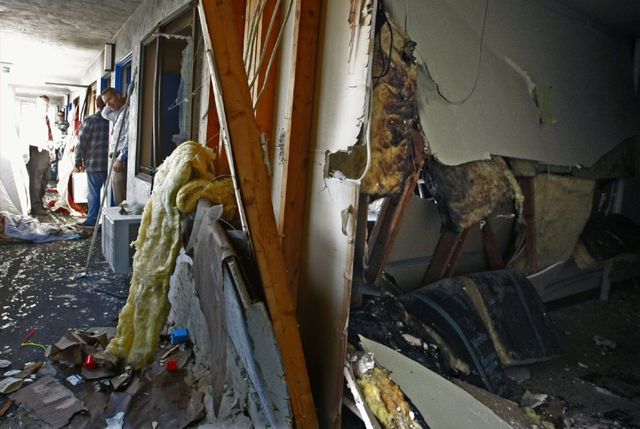
In May, the Oregonian reported that nine major hash oil blasts had occurred in Oregon since 2011, four of them in homes or hotel rooms where children, including a newborn, were present. In one case, a 12-year-old girl suffered multiple broken bones after leaping from the second floor of an apartment building rocked by a butane hash oil (BHO) explosion.
Last year a 10-day old and one-year old baby and two women suffered injuries from a hash oil explosion in Forest Grove, Oregon, the site of another extensive fire from making hash oil in January, 2014. Two months ago, on July 22, it was announced that the District Attorney in Seattle filed charges against seven who caused explosions in the state of Washington.
Anger Management
Marijuana users like to claim they don’t get mad and violent, like the cocaine addicts and some alcoholics routinely do. If their marijuana usage leads to explosions, selfishness, abandonment, or narcissistic rage and anger, they fall into the same violent category as other substance abusers.
A case of violent child abuse erupted in Tampa, Florida in June. Christopher Finlayson, who babysat an 11-month old girl, tried to amuse her by tossing the child into the air. He tripped and dropped the child face-first onto the floor. When the child continued to cry, Finlayson went into a moment of rage and he “lost it.” The baby was totally unresponsive when the mother returned home. She took her to the hospital and authorities were called. The man admitted he had smoked a “blunt and a half” of marijuana the previous day and was unable to sleep the night before the incident.
Just a few days ago when police in Nevada went to investigate a case a suspected child abuse, they discovered a fetus in the freezer, with a gun and marijuana in the bassinet. This year authorities in Utah discovered that Megan Huntsman, heavy marijuana user, had buried 6 of her children over several years.
In July, four adults in south Modesto, California, pleaded no contest to severely beating a 7-week old girl. The child had several broken ribs, a lacerated liver and spleen and swelling on her brain. When authorities investigated the home 3 were used for growing marijuana for sale. They parents were charged with two counts of child cruelty, illegally growing with intent for sale, stealing electricity and damaging power lines.
According to a recent article “chronic [marijuana] users exhibit blunted emotional reaction to threat stimuli, which may also decrease the likelihood of aggressive behavior.” This study is one of many articles or studies using data while trying to promote marijuana usage. The study didn’t show what happens when one partner does marijuana while the other does not, sometimes a problem in abusive marriages. It also did not track child abuse.
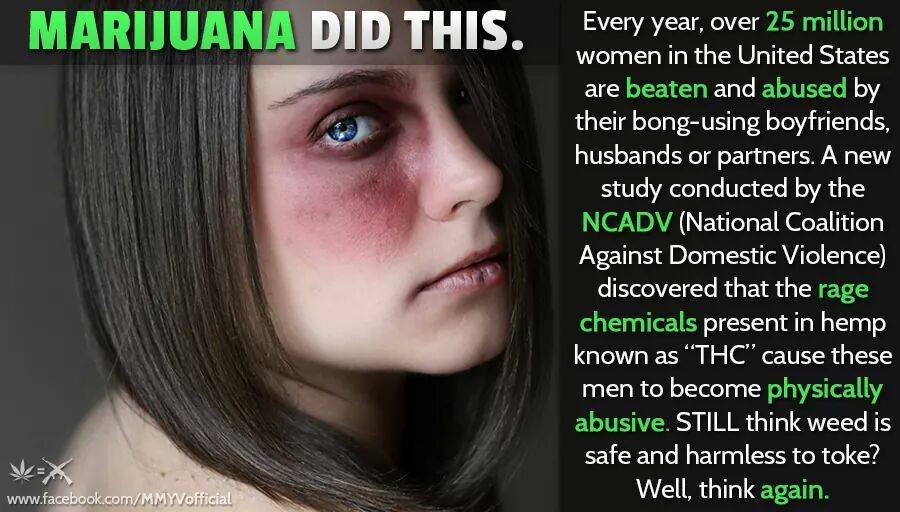
Why is marijuana likely to make some people violent, if using can cause a “blunted emotional reaction to threat?” The nature of a psychologically addictive substance is that a person needs it to feel ok and to feel normal. Take it away and there can be panic which results in anger. Leah Allen tells the story of how her cool, chronically high father abused her mother. Furthermore, disagreeing with the marijuana bloggers gets them so riled and angry.
What About DEA mistakes?
The tragedies of children lost to parents’ marijuana usage, and other drug usage, are larger than the widely-publicized mistakes made by the Drug Enforcement Agency, DEA. No teacher, parent, police agency, politician or worker of any sort is free from making mistakes. This summer a story spread about a failed raid which resulted in a grenade hitting a 20-month old child. It’s regretful that there was an injustice suffered by this child for that mistake. However, this baby and his parents will have their justice with law. There will be no justice for the marijuana – endangered children, as long as the marijuana community holds all the cards.
It’s a tragedy that because “Drug Wars Don’t Work,” Americans have legitimized a very dangerous drug. It’s a tragedy that the current anti-government trend spreading in American political circles also leads to more chaos and more abused children.
Based on the fire, anger, rage and explosions, we cannot continue this marijuana experiment if we are to have a saner, safer society.

